ONE in five skin cancer diagnoses have been missed during the coronavirus pandemic, a new study has revealed.
Experts also found that a third of dermatological appointments were missed compared to figures saw in 2019.

Read our coronavirus live blog for the latest news & updates…
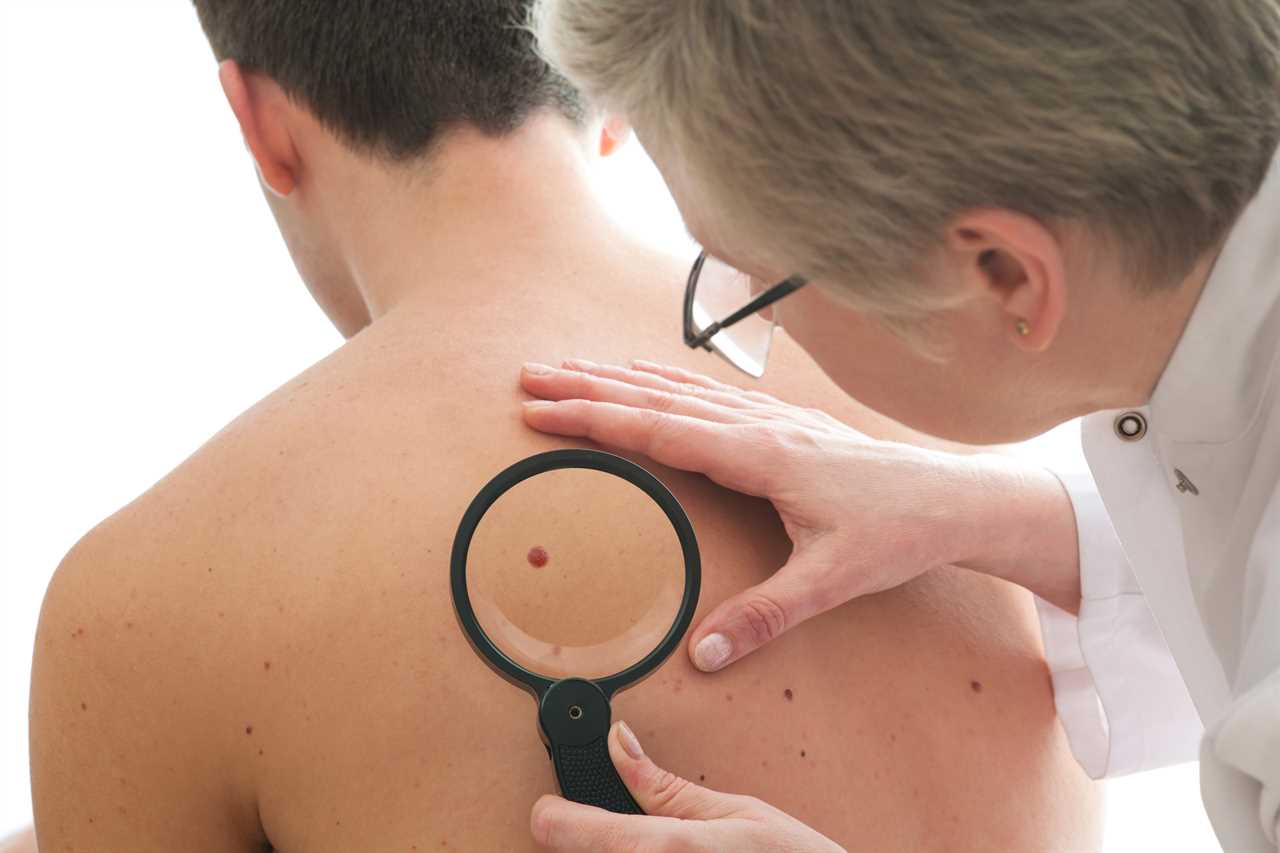
A new study has revealed than one in five skin cancer diagnoses have been missed during the pandemic
Early diagnoses is key to the treatment of melanomas and other skin cancers, the fact that an estimated 3,735 Britons missed their melanoma diagnosis in 2020 is lethal, experts have warned.
A global survey of over 700 dermatologists revealed the shocking impact the coronavirus pandemic has had on the detection of skin cancer.
At the start of the pandemic last year many services were cancelled or postponed in order to allow the NHS to deal with the ongoing crisis.
Waiting times have increased and just last month it was reported that a record 4.5 million Brits are now on NHS waiting lists.
Many people are still too afraid to attend their local GP surgery, despite the NHS’ reassurance that it is “open for everyone”.
Initially the “stay at home” guidelines imposed by the government to stop the spread of Covid-19 confused people as to what was an essential reason to leave the house.
It’s important that if you have any signs of Covid-19, such as a new persistent cough, a loss of taste and smell or a high temperature, then you should isolate and get a test.
But if you’re concerned about your health and well being and you’ve noticed anything unusual then you shouldn’t hesitate in seeing your GP.
The study, conducted by the Global Coalition for Melanoma Patient Advocacy revealed that compared to a normal year of performing patient skin examinations, dermatologists estimate that one fifth (21 per cent) of melanomas may have gone undiagnosed in 2020.
They also estimate that one third (33.6 per cent) of dermatological appointments were missed due to the pandemic.
The study looked at data from the World Health Organisation (WHO) which states incidence of Melanoma and Melanoma mortality.
It then compared these to the estimated number of people who had been left undiagnosed due to the pandemic.
What are signs of skin cancer?
The most common sign of skin cancer is a change to a mole, freckle or normal patch of skin.
Here, we share the symptoms you need to know – to spot the signs of the three most common skin cancers.
Melanoma
When it comes to moles, they are usually about a quarter of an inch in size, evenly coloured brown, tan or black and can be flat or raised.
Some are present at birth, but most appear as children or young adults and once they’ve developed, they usually stay the same size, shape and colour.
The most important warning sign of melanoma is a new spot on the skin or when a mole changes in appearance.
Superficial spreading melanoma
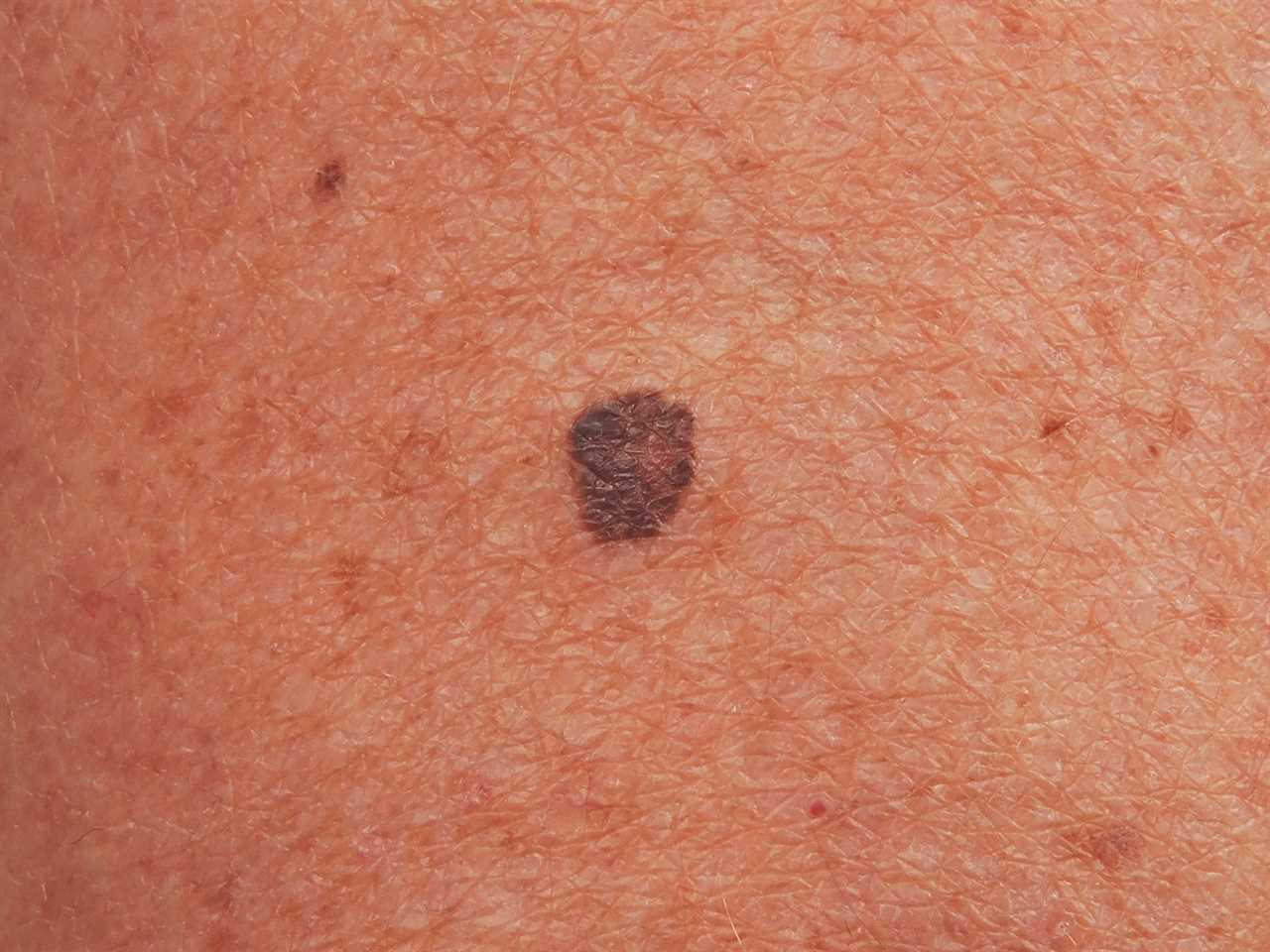 A malignant superficial spreading melanoma on the thigh
A malignant superficial spreading melanoma on the thigh
Around 70 per cent of all melanoma cases in the UK are superficial spreading melanomas.
They’re more common in people with pale skin and freckles, and much less common in darker skinned people.
They initially tend to grow outwards rather than downwards, so don’t pose a problem. However, if they grow downwards into the deeper layers of skin, they can spread to other parts of the body.
Therefore, you should see your GP if you have a mole that’s getting bigger, particularly if it has an irregular edge.
Nodular melanoma
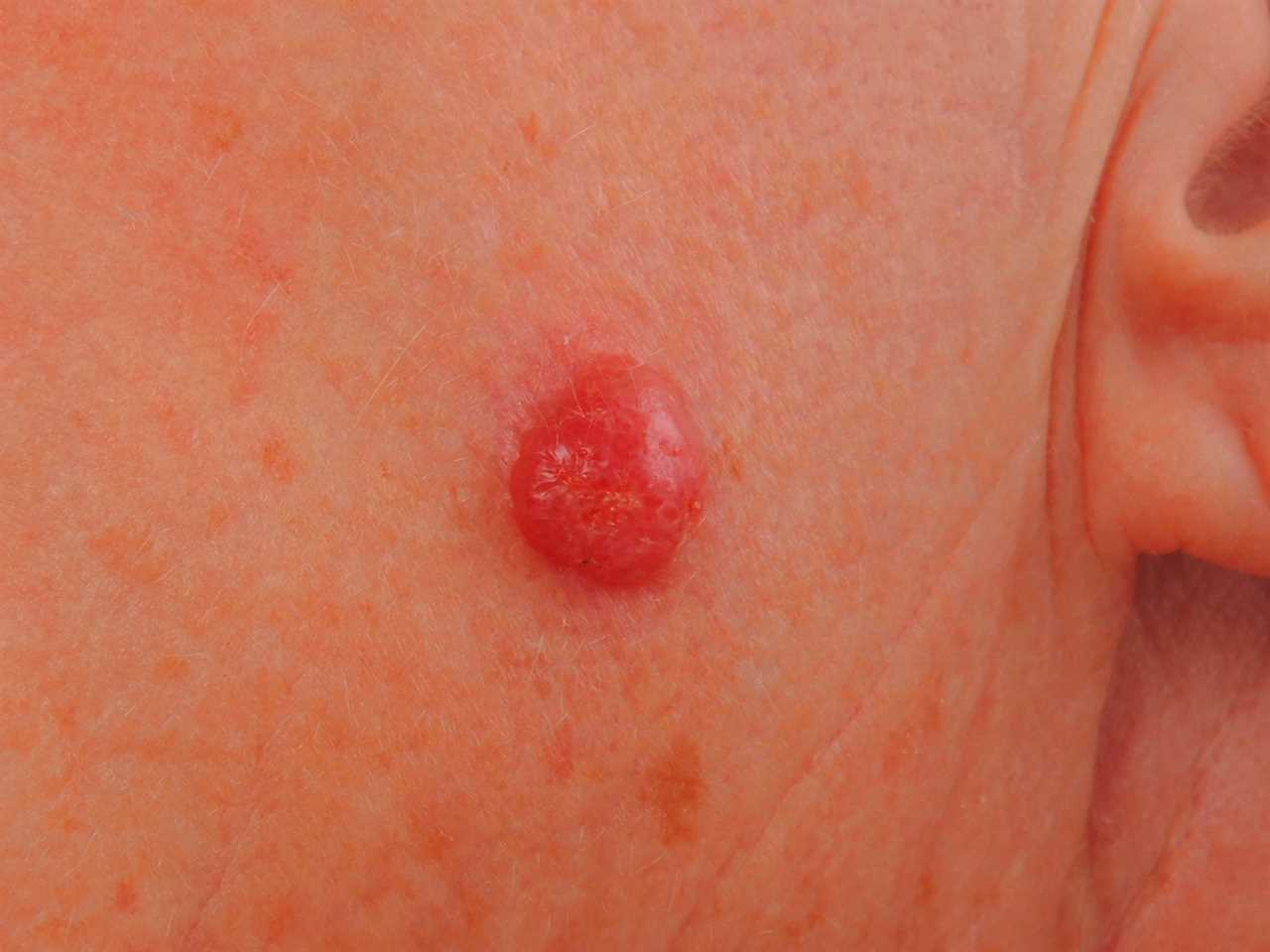 A nodular melanoma which is one of the fastest-growing types
A nodular melanoma which is one of the fastest-growing types
Nodular melanomas are a faster-developing type of melanoma that can quickly grow downwards into the deeper layers of skin if not removed.
They usually appear as a changing lump on the skin which might be black to red in colour.
Often nodular melanomas grow on previously normal skin and most commonly occur on the head and neck, chest or back.
A common symptom is bleeding or oozing.
Lentigo maligna melanoma
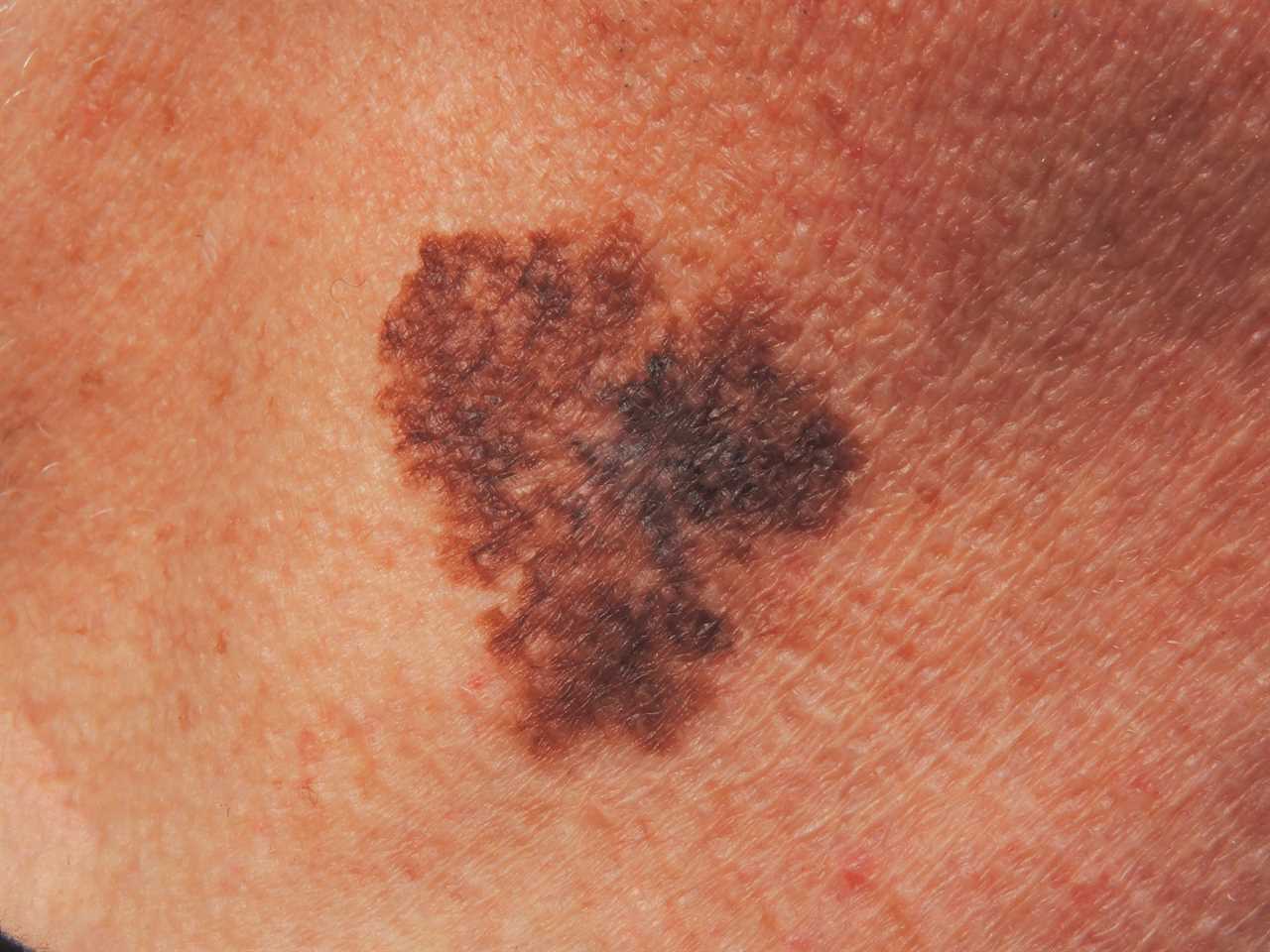 A Lentigo maligna melanoma mole on the neck
A Lentigo maligna melanoma mole on the neck
These most commonly affect older people, particularly those who’ve spent a lot of time outdoors.
They develop slowly over a number of years and appear in areas that are often exposed to the sun, such as the face.
To start with, lentigo maligna melanomas are flat and develop sideways in the surface layers of skin.
They look like a freckle but they’re usually larger, darker and stand out more than a normal freckle.
They can gradually get bigger and may change shape and at a later stage, they may grow downwards into the deeper layers of skin and can form lumps.
Basal cell carcinoma
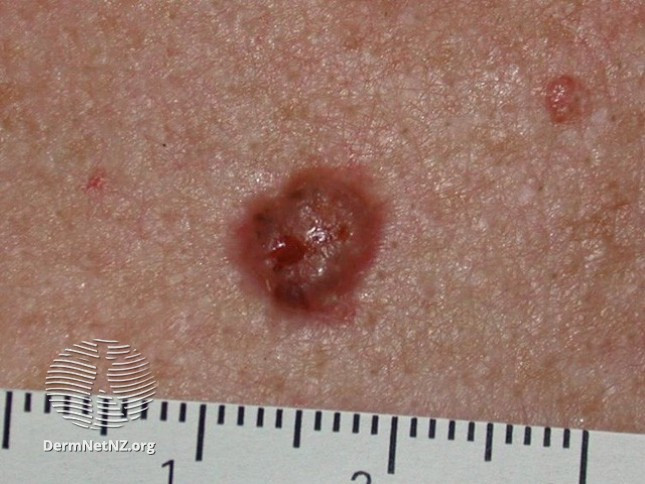
Around 75 per cent of all skin cancers are basal cell carcinomas, pictured
Basal cell carcinoma (BCC) is sometimes referred to as a rodent ulcer.
The disease affects the outermost layers of cells in the skin.
Around 75 per cent of all skin cancers are BCCs, which are typically slow-growing and almost never spread to other parts of the body.
If treated at an early stage, this form of skin cancer is usually completely cured.
Squamous cell carcinoma
Another form of non-melanoma, skin cancer, is squamous cell carcinoma.
This is a cancer of the keratinocyte cells which are in the outer layer of the skin.
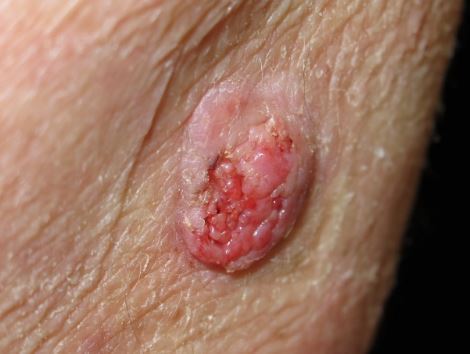 Squamous cell carcinoma is another type of skin cancer
Squamous cell carcinoma is another type of skin cancer
These cells are mainly found on the face, neck, bald scalps, arms, backs of hands and lower legs.
Experts are now urging Brits to take the time to check their skin.
Melanoma UK has teamed up with health technology firm SkinVision to offer a service that helps Brit perform regular skin checks and flags up
potential cancers to the attention of healthcare professionals.
LIFE SAVING
As part of their ‘LOOKUP’ campaign, it’s also offering two digital reminder tools to encourage people to check their skin.
The device from SkinVision can do a body scan and if any issues are detected it can make sure you get to the doctor in time.
Users receiving a high-risk score through the SkinVision Smartcheck also have their result reviewed by a clinician before being encouraged to contact their local healthcare professional for treatment.
The app demonstrated a sensitivity rate of 95.1 per cent and specificity rate of 78.3 per cent in the most recent peer reviewed clinical trial.
The partnership gives skin cancer sufferers free annual licenses through Melanoma UK.
Ms Cannon added that the app “could save your life”.
SkinVision’s UK Director Gavin Matthews said that the drop in skin cancer diagnoses during the pandemic has been a “big concern”.
He added: “Alongside our work with the NHS to help them recover, this partnership is really exciting because it goes right to the root of the problem.
“The biggest challenge is still that people don’t have the awareness to check their skin often enough and don’t have the skills to check accurately when they do.
“Melanoma UK’s mission is something we’re proud to be part of, not just by helping early detection with our service now, but also through the other great work that our ongoing donations will support.”













